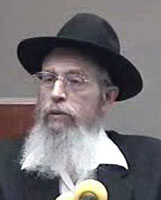Beit Midrash
- Torah Portion and Tanach
- Vayikra
- Emor
- Sections
- Chemdat Yamim
- P'ninat Mishpat
Case: The plaintiff (=pl) hired the defendant (=def), an architect, to draw up plans to add a floor to his house and get municipal approval. Def gave an estimate of 9,500 shekels, based on 30 hours to accomplish the tasks. They signed a contract along these lines, adding that the price can change according to the work needed. Def quickly exceeded the estimate, and pl initiated non-judicial arbitration. The arbitrator (=arb) made a compromise about the past, and set a price (4,176 shekels) for all future work until pl would receive his permit or pl would approve extra work. Def started a major new element of the job without consultation and charged pl 12,180 shekels for it before the permit was received. Pl went back to arb, who approved 8,000 shekels of the charge. Matters with the municipality became more complicated, and def asked for more money to deal with it. When pl refused, def stopped working, and the municipality closed the file. As a result, pl fired def and demanded a refund, claiming that def had failed to get the permit and made unreasonable financial demands. Def argues that pl’s intervention in conferring with municipality officials undermined his efforts and that pl acknowledged that if the need for work increased, he deserved more.
Ruling: We must now determine who is to blame for def’s stopping to work. Arb’s second ruling states that def was to continue with no further charge unless pl was to agree to new responsibilities, which is one valid way to set employment rules for an architect. Therefore, def did not have a right to stop working.
Nevertheless according to dayan #1, def can keep the additional money he already received because pl contributed to the situation by being very uncooperative in def’s work, which increased the time needed. Also, pl benefited from def’s added work, as it clarified what further steps will be needed to complete the job. Halacha recognizes payment for incomplete benefit provided (see Shulchan Aruch, Choshen Mishpat 264:4). Since it is unfeasible to estimate, the best compromise is for def to keep the money paid (around 21,000 shekels).
Dayan #2 posited that while incorrect, def’s reading of arb’s unclearly written rulings was reasonable. Therefore, pl’s unilateral cessation of def’s employment was wrong. While in theory it would be best for def to resume work, this is impractical based on the sides’ present relationship. Based on an estimation of the value of the work (details beyond our scope), def must return 5,000 shekels and will thereby be exempted from obtaining a permit for pl.
According to dayan #3, since the two sides agreed to arb’s second ruling, it was unreasonable for def to have yet again created unauthorized charges and then breach his obligation by stopping to work until being paid more. In order for an individual to fire a worker, his shortcomings must have been repeated, be after warning, or cause damage (see Rama, CM 306:8). In this case, def failed all tests. It also cannot be proved that def’s work will bring benefit when pl hires another architect to continue. Therefore, def should return everything except for what arb awarded him for past work in the first ruling.
Based on the overlapping of a majority of dayanim, the ruling of dayan #2 is accepted.























